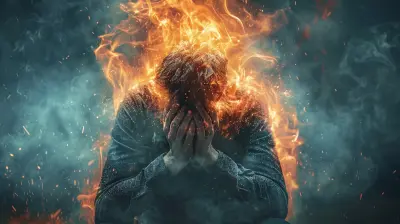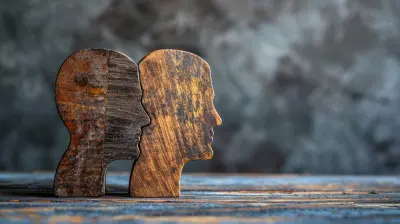The Power of Collective Wisdom in Group Therapy
11 November 2025
Group therapy is one of the most powerful tools in the world of mental health. Imagine sitting with a group of people, each carrying their own unique experiences, stories, and struggles, and realizing you’re not alone. It’s nothing short of magic. This is where collective wisdom comes into play. The combined knowledge, insight, and support from a group of individuals can often create a transformative experience that’s difficult to replicate one-on-one.
But what exactly is this "collective wisdom," and why is it so impactful in group therapy? Let’s dive deep into the nuances of this concept and unravel the power behind it.

What is Collective Wisdom?
Collective wisdom refers to the shared knowledge and insights that emerge from a group of people. This isn’t just about one person being super wise and everyone else benefiting from their brilliance. No, it’s more about the synergy that happens when people come together with open minds, ready to learn from and support one another.Think of it like a potluck dinner. Everyone brings their own dish – some bring appetizers, some bring desserts, and others bring the main course. But together, it creates a feast that is far more satisfying than any single dish could provide. Similarly, in group therapy, each individual brings their personal experiences, perspectives, and emotional journeys to the table, contributing to a collective pool of wisdom.
Why Is Collective Wisdom So Powerful in Group Therapy?
There’s a saying: "None of us is as smart as all of us." It’s true, especially in the context of therapy. When people come together in a group, they often discover that their shared experiences can lead to new insights. What one person might overlook or struggle with, another might have already faced and conquered. This mutual exchange of ideas, emotions, and coping strategies creates a sort of "super brain" that’s more powerful than any single individual’s insights.But let’s break it down a bit more. Here are some key reasons why collective wisdom works so well in group therapy:
1. Shared Experiences Reduce Isolation
One of the most painful aspects of struggles like depression, anxiety, or trauma is the feeling of isolation. It’s easy to think, "No one else understands what I’m going through." But in a group therapy setting, when you hear someone else describe feelings or experiences similar to yours, it can be an instant relief. You realize you’re not the only one. This shared understanding fosters a sense of belonging and connection, which is essential for healing.2. Diverse Perspectives Open New Doors
The beauty of a group is that it’s made up of people from different walks of life. Their backgrounds, beliefs, and coping mechanisms can vary drastically from yours. But that’s what makes it so powerful. Someone else’s perspective might hold the key to a solution or coping strategy you hadn’t even considered. Think of it like standing in front of a locked door, and just when you’re about to give up, someone in the group hands you the key you didn’t know you needed.3. A Safe Space to Experiment
Group therapy isn’t just about talking; it's also about practicing. The group acts as a mini-laboratory for testing out new behaviors, thoughts, and coping mechanisms. Want to try setting boundaries? The group can help you role-play. Need to work on expressing your emotions? The group gives you a safe space to practice and receive feedback. It's like a dress rehearsal for real-life scenarios.4. Accountability and Motivation
Ever tried to stick to a gym routine on your own? It’s tough, right? But when you’ve got a workout buddy or a group of friends cheering you on, it suddenly becomes more manageable. The same principle applies in group therapy. The group provides a sense of accountability. If you set goals or share intentions, the group can be there to check in, offer encouragement, and hold you accountable. It’s much harder to backslide when you know others are rooting for your success.5. Unconditional Support and Empathy
There’s something deeply comforting about being in a space where you know others truly "get it." Group therapy creates a non-judgmental, empathetic environment where everyone listens and supports one another. It’s like having an emotional safety net. Even if you stumble or have setbacks, the group is there to catch you, support you, and help you move forward.
How Collective Wisdom Emerges in Group Therapy
Now that we’ve explored why collective wisdom is so impactful, let’s look at how it naturally unfolds in a group therapy setting. Collective wisdom doesn’t just happen because people are in the same room. It requires a few key ingredients:1. Vulnerability
For collective wisdom to emerge, group members need to be willing to open up. Vulnerability is the cornerstone of this process. When one person shares their personal struggles or triumphs, it creates a ripple effect. Others feel more comfortable sharing their own experiences. This openness is what allows wisdom to flow freely within the group.2. Active Listening
It’s impossible to gain collective wisdom if no one is truly listening. In group therapy, participants are encouraged to practice active listening – paying attention, being present, and genuinely hearing what someone else is saying. This not only helps the speaker feel validated but also allows listeners to take in new perspectives and insights that they might not have considered before.3. Trust and Safety
For people to be vulnerable and share openly, there needs to be a strong sense of trust and safety within the group. This is often fostered by the therapist leading the group, who sets the tone for confidentiality, respect, and empathy. When people feel safe and trust each other, they’re more likely to contribute to the collective wisdom.4. Non-judgmental Attitude
Judgment blocks the flow of wisdom. If people feel they’re being judged or criticized, they’re less likely to share openly. A non-judgmental attitude is essential for creating an environment where wisdom can grow. In group therapy, participants are encouraged to approach each other with curiosity and empathy, rather than judgment or criticism.
The Therapist’s Role in Facilitating Collective Wisdom
While the collective wisdom of the group is incredibly powerful, the therapist plays a crucial role in guiding and facilitating the process. Think of the therapist as a gardener. They don’t create the plants, but they nurture the environment where growth can happen. The therapist helps guide conversations, ensures that everyone has a chance to speak, and fosters an atmosphere of trust and safety.A skilled therapist also helps the group recognize and reflect on the collective wisdom that’s emerging. Sometimes, people in the group might not even realize the insights they’re sharing until the therapist points it out. By highlighting these moments of wisdom, the therapist helps the group build on them and continue growing together.

The Challenges of Group Therapy
Of course, like any therapeutic approach, group therapy isn’t without its challenges. Some people might find it difficult to open up in front of others, especially in the beginning. There might be personality clashes or disagreements within the group. And sometimes, hearing about someone else’s struggles can feel overwhelming, especially if you’re already dealing with your own emotional load.But these challenges are often part of the process. Just like in life, group therapy isn’t always smooth sailing. However, the beauty of group therapy is that these challenges can become opportunities for growth. Disagreements can lead to deeper understanding. Emotional overwhelm can be a reminder to practice self-care and boundaries.
Is Group Therapy Right for You?
So, how do you know if group therapy is the right fit for you? If you’re someone who values connection and is open to learning from others, group therapy could be incredibly beneficial. It’s especially helpful for people who struggle with feelings of isolation, as it provides a built-in support network.However, if you’re someone who feels uncomfortable opening up in front of others, or if you’re going through a particularly intense personal crisis, it might be worth discussing with a therapist whether group therapy or individual therapy is the best option for you at this time.
Final Thoughts: The Power of Collective Wisdom
Group therapy is more than just a bunch of people sitting in a circle and talking. It’s a dynamic, transformative process driven by the collective wisdom of its participants. When people come together to share their experiences, support each other, and learn from one another, the result is something truly magical.The power of collective wisdom is that it reminds us we’re not alone in our struggles. We don’t have to figure everything out on our own. Sometimes, the answers we’re searching for can be found in the words and experiences of others.
So, if you’ve ever wondered whether group therapy might be right for you, consider the profound impact that collective wisdom can have. You just might find the support, insight, and healing you’ve been searching for.
all images in this post were generated using AI tools
Category:
Group TherapyAuthor:

Jenna Richardson
Discussion
rate this article
1 comments
Hailey Diaz
Collective wisdom in group therapy fosters healing, connection, and diverse perspectives for personal growth.
November 11, 2025 at 3:31 AM

Jenna Richardson
Thank you! I completely agree—collective wisdom truly enriches the therapeutic experience, promoting deep connections and varied insights that facilitate healing and personal growth.


